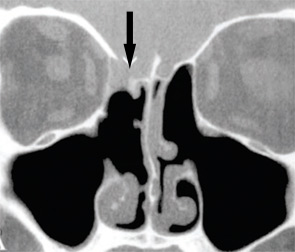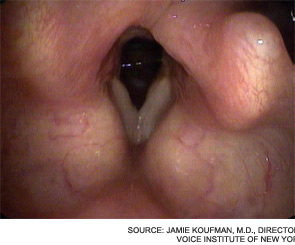Recent publication of practice parameters for surgery in adults with obstructive sleep apnea (OSA) by the American Academy of Sleep Medicine (AASM) has set off another round of debate on the need for otolaryngologists to get involved in generating their own guidelines. Although otolaryngologists have yet to agree on whether or not the time is right for guidelines on surgical treatment for sleep apnea, consensus can be claimed regarding the need perceived by the American Academy of Otolaryngology–Head and Neck Surgery (AAO-HNS) to get on the evidence-based bandwagon.

Lingering Issues: Challenges remain in repairing CSF leaks
Once the province of neurosurgeons, cerebrospinal fluid (CSF) leak repair is now handled mostly by otolaryngologists. This change has occurred over the past couple of decades, during which time the evolution of endoscopic tools and techniques has made possible extracranial rather than intracranial repair. The success rate for repairing these leaks from below has reached about 90 percent, particularly for small leaks.
Response from the editor
Dr. Sims has eloquently identified the value of diversity not only in otolaryngology, but also its contribution to the strength of the U.S. as a nation. Drs. Kuppersmith and Thomas have responded to his editorial indicating steps that the AAO-HNS has taken and is currently taking to increase diversity.
Old Problem, New Focus: Otolaryngologists tailor allergy treatments to geriatric patients
Allergic rhinitis among the elderly poses a particularly difficult diagnostic challenge for the otolaryngologist. As people age, they undergo immunosenescence. The thymus, which produces T cells against new invaders, atrophies markedly after adolescence, and this decline results in a less robust immune response to bacteria, viruses and presumably allergens (J Pathol. 2007;211(2):144-156). Consequently, physicians have assumed that allergies should decline as people age.

A Tailored Approach to Dizziness: Take extra caution and care in the elderly, panelists say
Dizziness is a particular danger among the elderly, but extra care taken by physicians can help ease their problems and help keep older patients functioning, panelists said at the 2010 Annual Meeting of the American Academy of Otolaryngology-Head and Neck Surgery, held here Sept. 26-29.
New Study Presents Education Opportunity: Nasal zinc side effects spark discussions about alternative treatments
Arecent study in Archives of Otolaryngology-Head and Neck Surgery on the potential side effects of nasal zinc therapies is the newest staging ground in the debate over how otolaryngologists can advise patients on the benefits of homeopathic treatments in the context of the common cold.

Progress in Chronic Laryngitis: Improvement in diagnosis but continuing debate
Chronic laryngitis is a multifactorial disease with a large differential diagnosis for the patient who presents with hoarseness. Fortunately, the diagnosis of inflamed larynx has improved in recent years.
The Faculty Mentor from the Resident’s Perspective
What is the experience of residents regarding mentorship during their otolaryngology residency? Background: Integral to the educational experience is the relationship between faculty and residents, which is based upon multiple types […]

The Great Debate: Canal-wall-up vs. canal-wall-down surgery for pediatric cholesteatomas
Treating Allergic Rhinitis: A Patient Experiment
Berrylin J. Ferguson, MD, FACS, FAAOA, associate professor of otolaryngology and director of the Division of Sino-Nasal Disorders and Allergy at the University of Pittsburgh School of Medicine in Pittsburgh, Pa., uses the following form to help determine which allergy treatments will work best for each patient.
- « Previous Page
- 1
- …
- 7
- 8
- 9
- 10
- 11
- …
- 29
- Next Page »
